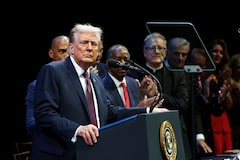September 10, 2025
In a surprising development that has sparked international debate, former U.S. President Donald Trump publicly expressed his dissatisfaction with a recent Israeli military strike in Qatar, a key U.S. ally in the Middle East. Speaking at a press conference on September 10, 2025, Trump described himself as “not thrilled” about the operation, which targeted an unspecified site in the Gulf nation. The strike, attributed to Israel by multiple sources, has raised concerns about escalating tensions in an already volatile region and has drawn attention to the delicate balance of alliances in the Middle East. While details of the strike remain limited, its implications for U.S. foreign policy, regional stability, and the broader geopolitical landscape are profound. This article examines the event, its context, and the potential ramifications for international relations.
The Israeli Strike: What We Know
According to reports from regional and international sources, the Israeli military conducted a targeted operation in Qatar on September 9, 2025. The specifics of the strike, including its target, scope, and casualties, have not been fully disclosed by either Israeli or Qatari authorities. However, initial accounts suggest that the operation was aimed at a facility or individual linked to activities deemed a threat to Israeli national security. Neither the Israeli government nor the Qatar-based Al Jazeera news network, which often covers regional conflicts extensively, has provided comprehensive details about the incident.
The Israeli military has a history of conducting covert and overt operations beyond its borders, often targeting groups or individuals it accuses of planning attacks against its interests. Qatar, a small but influential Gulf state, has long played a complex role in Middle Eastern geopolitics. The country hosts the Al Udeid Air Base, a critical hub for U.S. military operations in the region, and serves as a mediator in various regional conflicts, including negotiations involving Israel, Hamas, and other actors. The decision to carry out a military strike in Qatar, a U.S. ally and a key diplomatic player, has raised eyebrows and prompted questions about Israel’s strategic calculus.
Trump’s Reaction and Its Political Context
Former President Donald Trump’s comments came during a press conference in Florida, where he was addressing a range of domestic and international issues. Known for his outspoken style and his administration’s strong support for Israel during his presidency (2017–2021), Trump’s expression of displeasure was unexpected. “I’m not thrilled about what happened in Qatar,” he said, without elaborating on the reasons for his discontent. “Israel needs to be careful. We have a lot of allies in that region, and we don’t want to see things spiral out of control.”
Trump’s remarks reflect a rare moment of public criticism of Israel, a nation he championed during his presidency through policies such as the Abraham Accords, which normalized relations between Israel and several Arab states, and the relocation of the U.S. Embassy to Jerusalem. His comments may signal a shift in his approach as he positions himself for a potential 2028 presidential run, seeking to appeal to a broader electorate while maintaining his base’s support.
The former president’s statement also highlights the delicate nature of U.S. foreign policy in the Middle East. Qatar’s role as a host to U.S. military assets and its mediation efforts in conflicts involving Israel make it a linchpin in the region. Trump’s displeasure could stem from concerns about the strike’s impact on U.S.-Qatar relations, the stability of the Gulf Cooperation Council (GCC), or the broader U.S. strategy to counter Iran’s influence in the region.
Qatar’s Role in Regional Diplomacy
To understand the significance of the Israeli strike, it is essential to examine Qatar’s unique position in the Middle East. Despite its small size, Qatar wields considerable influence due to its vast natural gas wealth, strategic alliances, and diplomatic agility. The country has positioned itself as a mediator in numerous conflicts, including hosting peace talks between the Taliban and the Afghan government, facilitating negotiations between Israel and Hamas, and supporting various factions in regional disputes.
Qatar’s relationship with the United States is particularly significant. The Al Udeid Air Base, located southwest of Doha, is one of the largest U.S. military installations in the Middle East, serving as a hub for operations in Iraq, Syria, and Afghanistan. The base underscores Qatar’s importance as a strategic partner, and any military action on Qatari soil—especially by a U.S. ally like Israel—could complicate bilateral relations.
Moreover, Qatar’s hosting of Hamas’s political leadership has long been a point of contention. While Qatar insists that it provides a platform for dialogue to resolve conflicts, critics, including Israel, argue that the country’s support for Hamas enables terrorism. The Israeli strike may have targeted a figure or facility linked to Hamas, though no official confirmation has been provided. Such an action would align with Israel’s broader strategy of neutralizing threats from groups it designates as terrorist organizations.
Israel’s Strategic Motivations
Israel’s decision to conduct a military operation in Qatar, if confirmed, would mark a bold escalation in its approach to regional security. Over the past decade, Israel has increasingly relied on targeted strikes to address threats from groups like Hezbollah, Hamas, and Iran-backed militias in Syria, Lebanon, and Iraq. These operations often involve airstrikes, drone attacks, or covert actions by Israel’s intelligence services, such as Mossad.
The choice of Qatar as a target is particularly striking given the country’s status as a U.S. ally and its relatively neutral stance in the Arab-Israeli conflict. Several factors may have influenced Israel’s decision:
Perceived Threat: The strike may have been a response to an imminent threat, such as a planned attack by a group operating from Qatar. Israel has repeatedly emphasized its right to self-defense, and its military doctrine prioritizes preemptive action against perceived threats.
Hamas’s Presence: Qatar’s hosting of Hamas leaders, including figures like Khaled Meshaal, has long irritated Israel. If the strike targeted a Hamas figure or facility, it could reflect Israel’s frustration with Qatar’s role as a safe haven for the group.
Regional Power Dynamics: The strike may be part of Israel’s broader strategy to assert dominance in the region and deter adversaries, particularly Iran and its proxies. By acting decisively in Qatar, Israel could be sending a message to other regional actors about its willingness to operate beyond its borders.
Domestic Politics: In Israel, Prime Minister Benjamin Netanyahu faces ongoing domestic challenges, including political opposition and public discontent over security issues. A high-profile strike could bolster his image as a strong leader committed to national security.
However, the strike carries significant risks. Qatar’s close ties to the United States and its role in regional diplomacy mean that any military action on its soil could strain Israel’s relations with Washington and other Gulf states. The operation may also undermine the Abraham Accords, which rely on cooperation between Israel and moderate Arab states.
U.S. Foreign Policy and the Biden Administration’s Response
The Israeli strike places the Biden administration in a delicate position. The United States has long maintained a balancing act in the Middle East, supporting Israel’s right to defend itself while fostering partnerships with Arab states like Qatar. Any perception that the U.S. tacitly approved or failed to prevent the strike could damage its credibility in the region.
As of September 10, 2025, the Biden administration has not issued a formal statement on the incident, though sources indicate that U.S. officials are engaging with their Qatari and Israeli counterparts to assess the situation. The lack of a public response may reflect the administration’s desire to avoid escalating tensions while gathering more information.
The strike could also complicate U.S. efforts to mediate regional conflicts, particularly those involving Israel and Palestinian groups. Qatar has played a key role in facilitating ceasefires and humanitarian aid in Gaza, and any disruption to its relationship with Israel could hinder these efforts. Moreover, the incident may embolden Iran and its allies to exploit regional divisions, further complicating U.S. strategy in the Middle East.
Regional Reactions and Potential Fallout
The Israeli strike has elicited varied responses from regional actors. In Qatar, the government has yet to issue an official statement, but local media outlets have reported heightened security measures in Doha and other major cities. Public sentiment in Qatar, as reflected in social media posts, appears to be a mix of anger toward Israel and concern about the country’s vulnerability to external attacks.
In the broader Arab world, reactions have been mixed. Some governments, particularly those aligned with the Abraham Accords, may privately support Israel’s actions if they targeted a mutual adversary like Hamas. Others, including Iran and its allies, are likely to condemn the strike as an act of aggression and a violation of Qatar’s sovereignty. Iran’s foreign ministry issued a statement on September 10, 2025, calling the strike “a dangerous escalation” and urging the international community to hold Israel accountable.
The strike could also impact the Gulf Cooperation Council (GCC), which includes Qatar, Saudi Arabia, the United Arab Emirates, and other states. The GCC has historically sought to maintain unity in the face of external threats, but tensions between Qatar and its neighbors, particularly during the 2017–2021 blockade, highlight the fragility of this alliance. An Israeli strike in Qatar could exacerbate these divisions, particularly if other GCC members perceive Qatar’s hosting of groups like Hamas as a liability.
Historical Context: Israel’s Operations Abroad
Israel’s military operations beyond its borders are not a new phenomenon. Since its founding in 1948, Israel has conducted numerous strikes, assassinations, and covert operations in neighboring countries and beyond to neutralize threats. Notable examples include:
Operation Wrath of God (1972–1988): Following the Munich Olympics massacre, Israel launched a campaign to assassinate members of the Black September group responsible for the attack. The operation spanned multiple countries, including Lebanon, France, and Tunisia.
Operation Entebbe (1976): Israeli commandos conducted a daring raid in Uganda to rescue hostages from a hijacked airplane, demonstrating Israel’s willingness to operate far from its borders.
Strikes in Syria and Lebanon: Over the past two decades, Israel has conducted hundreds of airstrikes in Syria and Lebanon targeting Hezbollah, Iranian forces, and other groups it deems threats.
The Qatar strike, if confirmed, would fit into this pattern of proactive defense but would be notable for its location in a U.S.-allied state. Unlike Syria or Lebanon, Qatar’s status as a stable, diplomatically active nation makes the operation particularly audacious.
Implications for U.S.-Israel Relations
The Israeli strike and Trump’s subsequent comments highlight the complexities of the U.S.-Israel relationship. During his presidency, Trump pursued a staunchly pro-Israel agenda, including withdrawing from the Iran nuclear deal, recognizing Jerusalem as Israel’s capital, and brokering the Abraham Accords. His criticism of the Qatar strike suggests a nuanced view, possibly driven by concerns about the broader implications for U.S. interests.
For the Biden administration, the incident poses a diplomatic challenge. Publicly criticizing Israel could alienate pro-Israel voters and lawmakers, particularly as the 2026 midterm elections approach. However, failing to address Qatar’s concerns could strain ties with a key ally and undermine U.S. credibility in the Gulf. The administration may seek a middle ground, urging restraint from Israel while reaffirming its commitment to Qatar’s security.
Broader Geopolitical Ramifications
The Israeli strike in Qatar has the potential to reshape the Middle East’s geopolitical landscape. Key implications include:
Escalation of Tensions: The strike could provoke retaliatory actions from groups like Hamas or Hezbollah, leading to a broader conflict. Iran, which supports both groups, may seize the opportunity to escalate its proxy war against Israel.
Impact on Diplomacy: Qatar’s role as a mediator in regional conflicts could be jeopardized, particularly if the strike undermines its credibility or security. This could hinder efforts to resolve ongoing conflicts in Gaza, Yemen, and elsewhere.
U.S. Policy Challenges: The incident underscores the difficulty of balancing U.S. support for Israel with its partnerships in the Arab world. The Biden administration may face pressure to reassess its approach to the region, particularly as it seeks to counter China and Russia’s growing influence.
Domestic Repercussions in Israel: The strike could bolster Netanyahu’s domestic standing but may also deepen divisions within Israel, where public opinion on military operations abroad is often polarized.
Conclusion
The Israeli strike in Qatar, coupled with Donald Trump’s unexpected criticism, has thrust the Middle East into a new phase of uncertainty. While the full details of the operation remain unclear, its implications for regional stability, U.S. foreign policy, and Israel’s strategic priorities are significant. As the international community awaits further information, the incident serves as a reminder of the fragile balance of power in the Middle East and the challenges of navigating alliances in a region marked by competing interests.
The Biden administration, Israel, and Qatar now face critical decisions about how to respond to the strike and its fallout. For Trump, his comments reflect a broader effort to position himself as a pragmatic leader on the global stage, even as he navigates the complexities of U.S. politics. As events unfold, the international community will closely watch how this incident shapes the future of Middle Eastern geopolitics.







